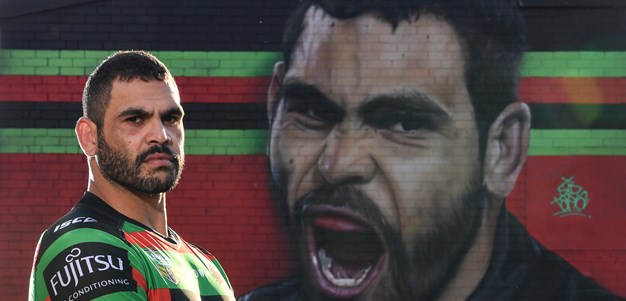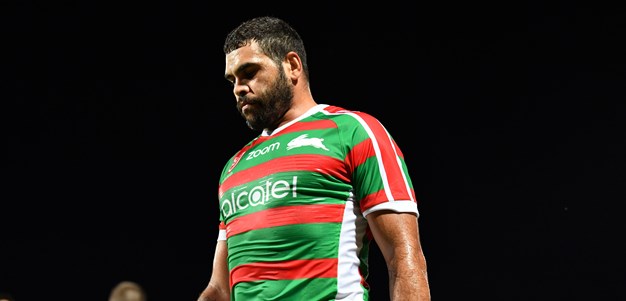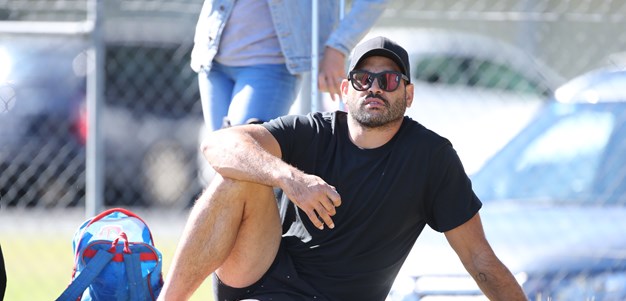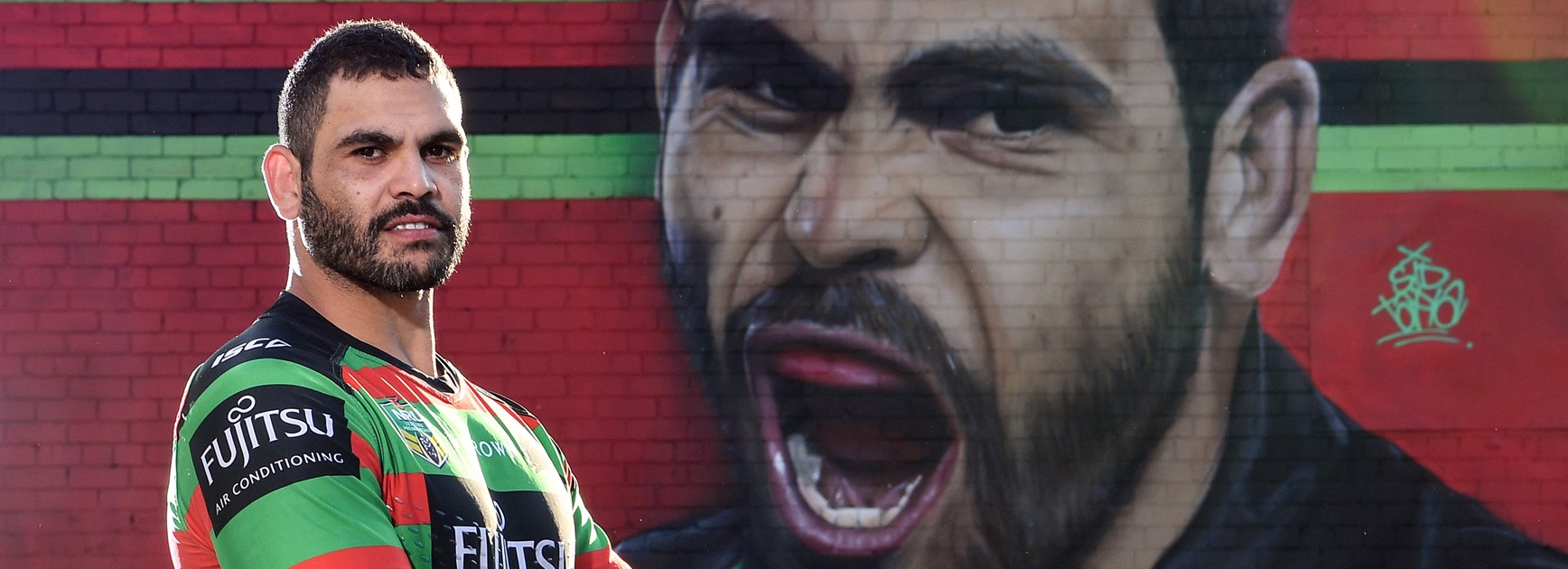
There is a mural in the heart of Redfern of Greg Inglis that encapsulates what his status in the rugby league pantheon will always be, and that is as a genuine icon of the game.
Inglis, wearing a South Sydney jersey, has the expression of a warrior. The backdrop is of the colours of the Aboriginal flag and the word 'Deadly', in capital letters, catch the eye.
On and off the football field he has certainly been, and will continue to be until he retires from club football at the end of 2020, a warrior in the true sense of the word.
The superhuman fend, deadly to its core, that emanates like a thrown spear from deep within his being has catapulted many an opponent into backward somersaults.
When Inglis walks around Redfern these days it is with his chest out and with a deep pride in his Indigenous heritage, and with an appreciation of how his example reverberates around the nation as an inspiration to multitudes of aspiring young footballers.
It is almost as though he is chanelling his ancestor Pemulwuy, that legendary resister of the European invasion of Australia more than two centuries ago.
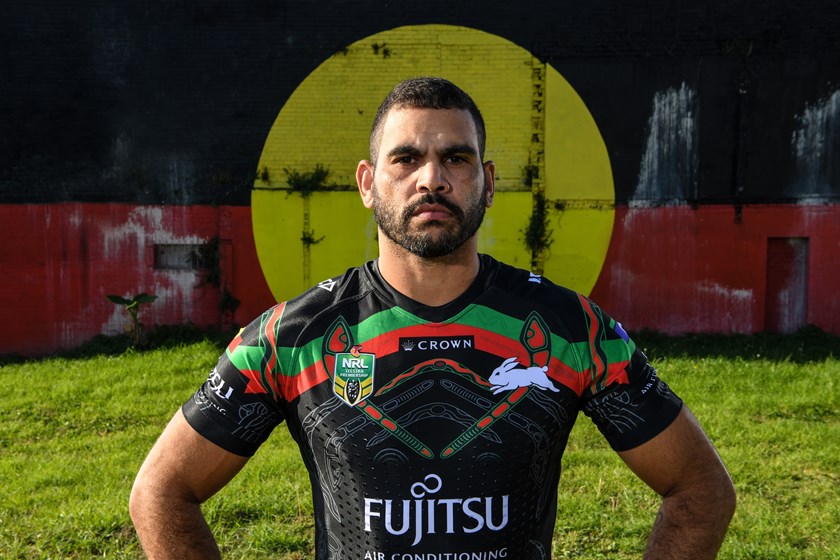
When Inglis hit the headlines in a big way in 2005 it was as a gangly 18-year-old creating havoc for Norths Devils in the Queensland Cup. He scored 18 tries in 12 Cup games that year as the word was soon circulating around Brisbane league circles that a powerhouse outside back not seen since Mal Meninga was in their midst.
His fame was soon to extend well beyond the Devils' home ground of Bishop Park.
It is easy to forget that before the 'Big Three' at Melbourne there was the 'Big Four', with Inglis an integral member of a quartet that stormed to two grand final wins in 2007 and 2009.
It is as a centre that he has played most of his representative career but Inglis has also won the Dally M five-eighth of the year in 2008 and the Dally M fullback of the year in 2013. It was at fullback that he inspired the Rabbitohs to a 33-year drought breaking premiership in 2014.
That someone born and raised in NSW should have carved out a State of Origin career with the Maroons has always raised eyebrows south of the Tweed River, but Inglis has always spoken of the sense of belonging he has felt in Queensland.
That goes back to the year he spent living with Adrian Coolwell's Indigenous family while attending Wavell State High in Brisbane.
It is a belonging that became stronger from the moment he walked into Maroons camp when Mal Meninga gave him an Origin debut in 2006.
Queensland will relish Inglis's final year in a maroon jersey in 2019 because it is in the State of Origin arena that he has stamped himself as one of the great centres of any era. Such is his class that Queensland could also switch Inglis back to the custodian's role to replace Billy Slater and not miss a beat.
His Origin try tally of 18 in 32 appearances is an all-time record and you have always got the sense that Inglis has an otherworldly power when he pulls on a Maroons jumper. The tears that flowed when Kevin Walters told him he would captain Queensland last year spoke of the emotive bond he shares with the state and the Maroons.
To watch him walk around Queensland camp at Sanctuary Cove was to see a man who seemed 10 feet tall and bulletproof, and he carried that mentality into both Origin games that he led his beloved Maroons where he played with a ferocity that reverberated around the stadium.
Inglis these days carries with him an aura that radiates pride, strength and a certain inscrutability. Underneath however is a vulnerability that in recent years he has been willing to express in the public arena where he has bravely spoken of his own mental health battles.
Inglis is also far from perfect. His arrest last year for drink driving attests to that, an indiscretion he was deeply apologetic for.
It is worth noting that despite the gravity of that reckless act, he was caught while driving home from the Koori Knockout in Dubbo where his presence was a source of great encouragement to the Aboriginal community in general.
It is a great shame that he would subsequently then lose the captaincy of the Kangaroos, a team he has always represented with distinction in 39 Tests and has been an automatic selection for when fit since making his Australian debut in 2006.
The name 'Arthur Beetson' has often been on Inglis's lips when discussing Kangaroos and Maroons matters.
In 2012 Inglis, in an interview with Rugby League Week, spoke at length of his deep appreciation for Beetson as a trailblazer both as the first Aboriginal captain of any Australian side and as the impetus for the State of Origin concept.
"Whenever you say 'Arthur Beetson' you remember the great legacy he has left behind," Inglis said at the time.
Inglis still has more chapters to write in his own storied career. Wayne Bennett has always said that Inglis is one of the legends of the game he wanted to coach, and now he has his chance. Together the duo may yet conjure up what would be a fairytale premiership.
Either way, in 20 years time you can be sure there will be other Indigenous legends of the game who will mention Inglis's name with reverence, and also reflect on the great legacy he has left behind.

